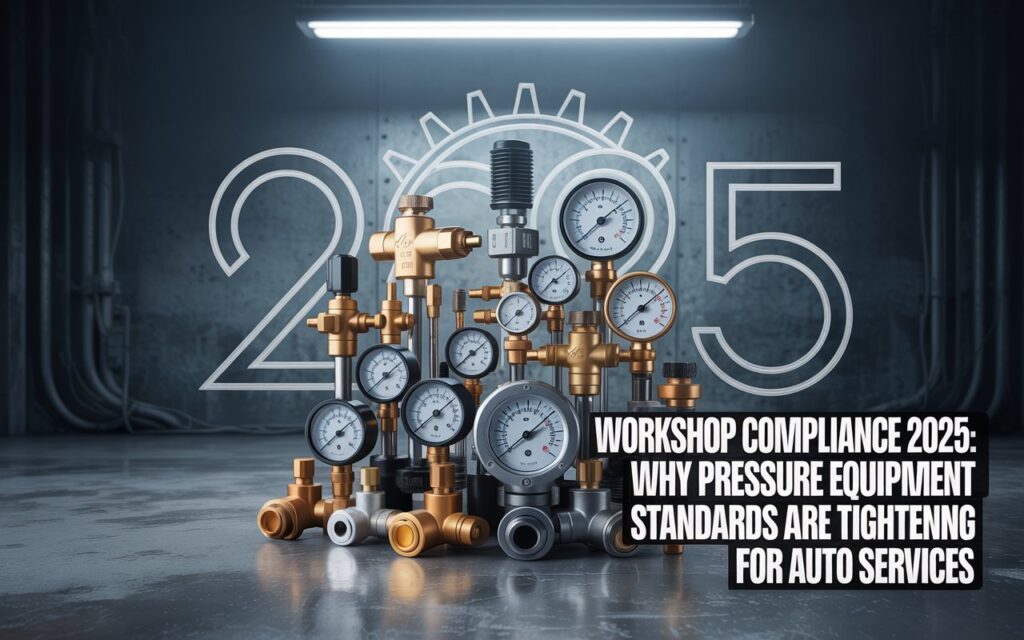Workshop Compliance 2025: Why Pressure Equipment Standards Are Tightening for Auto Services
Share
Share

The automotive service industry in Australia is undergoing a major shift. With new compliance standards expected by 2025, workshops are under increasing pressure to ensure their equipment is safe, reliable, and fully calibrated. One area gaining the most attention is pressure equipment—from compressors and gauges to hydraulic lifts and testing tools. These changes are not just about ticking boxes for regulators; they are about protecting workers, enhancing service quality, and meeting industry-wide safety standards.
In this article, we explore why pressure equipment compliance is tightening, how it impacts Australian auto services, and why investing in professional pressure testing and calibration services in Australia is becoming a non-negotiable requirement for workshops.
Why Pressure Standards Are Evolving in the Auto Industry
Traditionally, compliance for auto workshops focused more on environmental impact and worker safety measures like protective gear. However, regulators are now recognizing that faulty or uncalibrated pressure equipment can cause serious accidents, ranging from minor injuries to catastrophic failures.
By 2025, Australian Standards (AS/NZS) are expected to expand requirements for:
These measures are designed to align workshops with international safety benchmarks, ensuring Australian businesses remain globally competitive.
Risks of Neglecting Pressure Equipment Maintenance
Workshops that delay or ignore pressure compliance open themselves up to multiple risks. Not only does faulty equipment endanger employees, but it can also damage customer vehicles and attract heavy fines from regulators.
Uncalibrated gauges, for example, may provide inaccurate readings during tyre inflation or hydraulic testing. This can lead to unsafe conditions for both mechanics and drivers. Furthermore, equipment failure during daily operations often results in unexpected downtime, which directly affects workshop revenue.
The 2025 Compliance Checklist for Workshops
As regulations tighten, workshops must start preparing now. Here are key steps workshops should prioritize before 2025:
These proactive measures will not only protect workshops from penalties but also build trust with customers who value transparency and safety.
Why Professional Calibration Services Are Essential
While some workshop owners may be tempted to rely on in-house checks, professional calibration services provide the accuracy and certification regulators demand. Partnering with specialists ensures:
That’s why many leading businesses are turning to experts like AMS for professional pressure testing and calibration services in Australia.
Global and Local Influences on Compliance
Australia is not acting in isolation. International bodies such as the International Organization for Standardization (ISO) and WorkSafe authorities are shaping how equipment standards evolve.
According to WorkSafe Victoria, pressure vessels and systems are among the highest-risk categories in industrial workplaces. Aligning auto workshops with these global safety standards reduces insurance risks, enhances workshop reputation, and ensures mechanics can operate in safe environments.
The Long-Term Business Benefits of Compliance
Many workshop owners see compliance as an expense, but in reality, it’s an investment with long-term payoffs. Regular calibration and testing of equipment results in:
Workshops that adopt these practices early will gain a competitive edge in 2025 and beyond.
Preparing for 2025: What Workshop Owners Should Do Today
Instead of waiting for regulators to enforce stricter rules, forward-thinking workshops are already implementing compliance measures. By conducting internal audits, partnering with trusted service providers, and maintaining proper documentation, auto service businesses can future-proof their operations.
Ultimately, compliance isn’t just about meeting government standards—it’s about ensuring safety, efficiency, and customer satisfaction in an increasingly competitive industry.
Conclusion
The tightening of pressure equipment standards in 2025 represents a turning point for Australian auto services. Workshops that take proactive steps today will not only stay compliant but also position themselves as leaders in safety and service quality.
By working with trusted experts like AMS for professional pressure testing and calibration services in Australia and staying informed through resources such as WorkSafe Victoria and the Australian Government Department of Industry, Science and Resources, workshops can confidently navigate the coming changes.
Leave a Reply